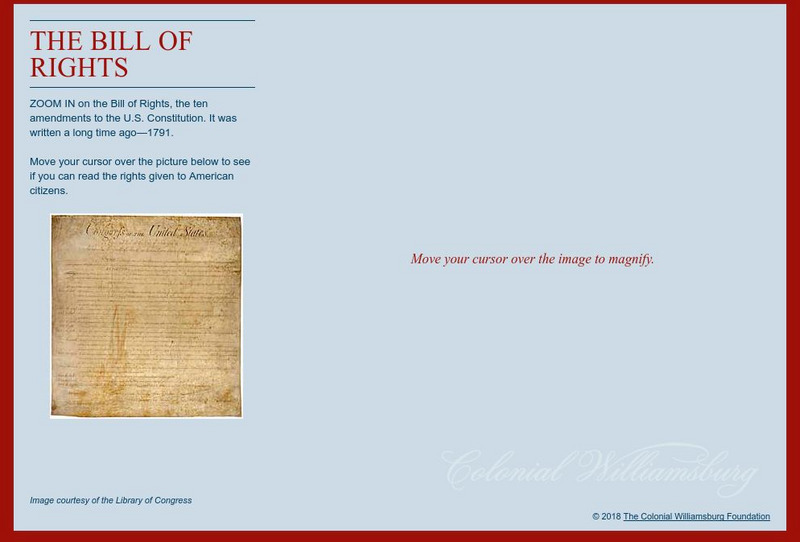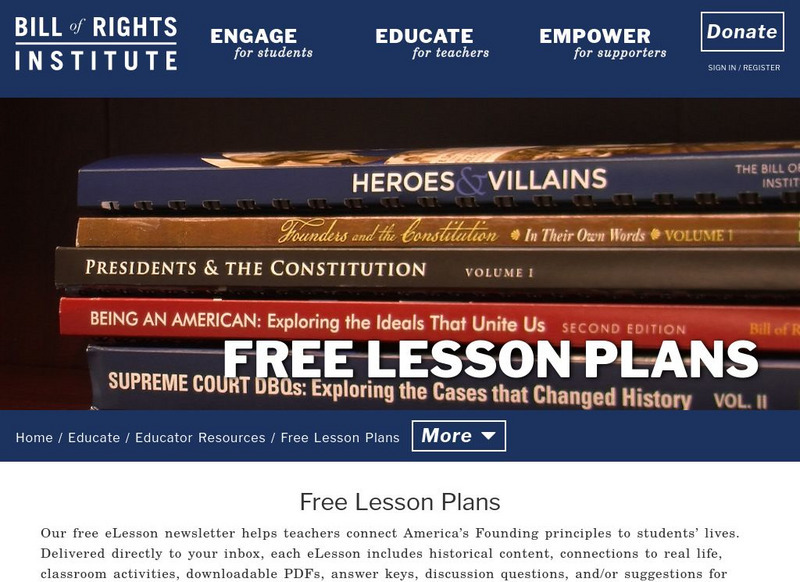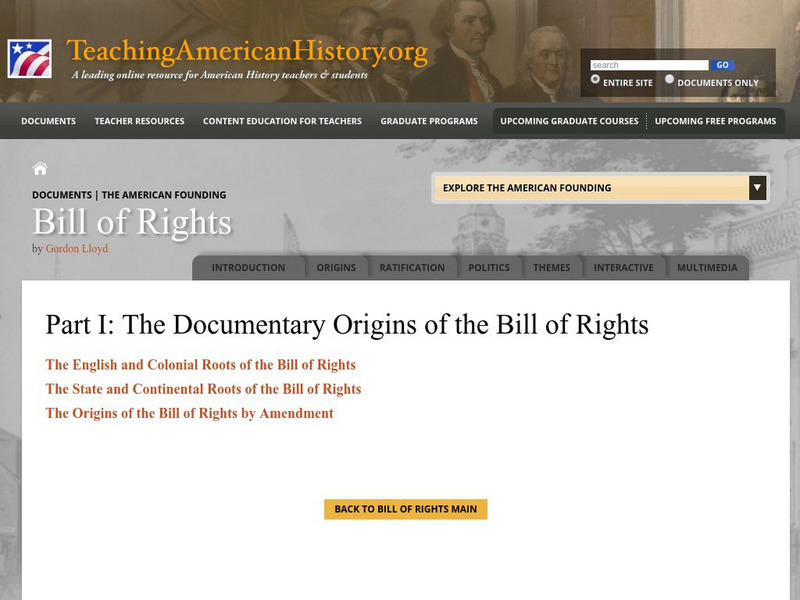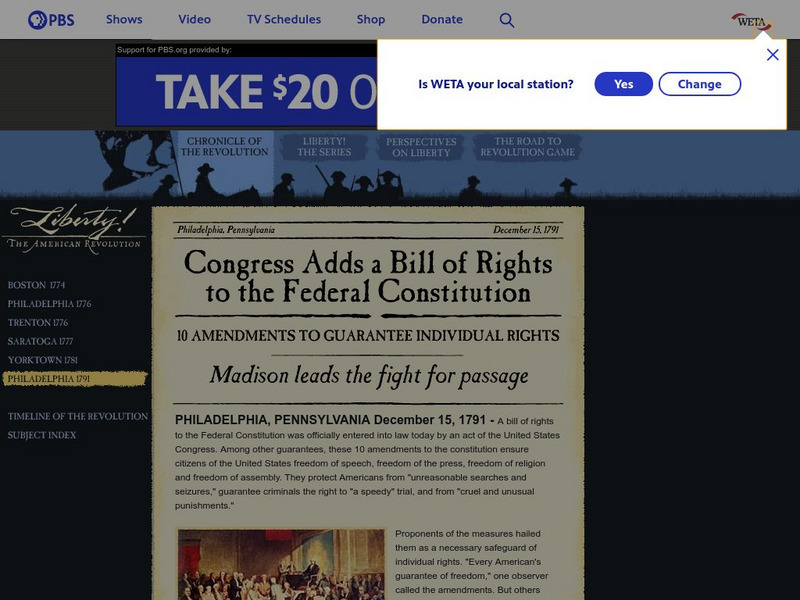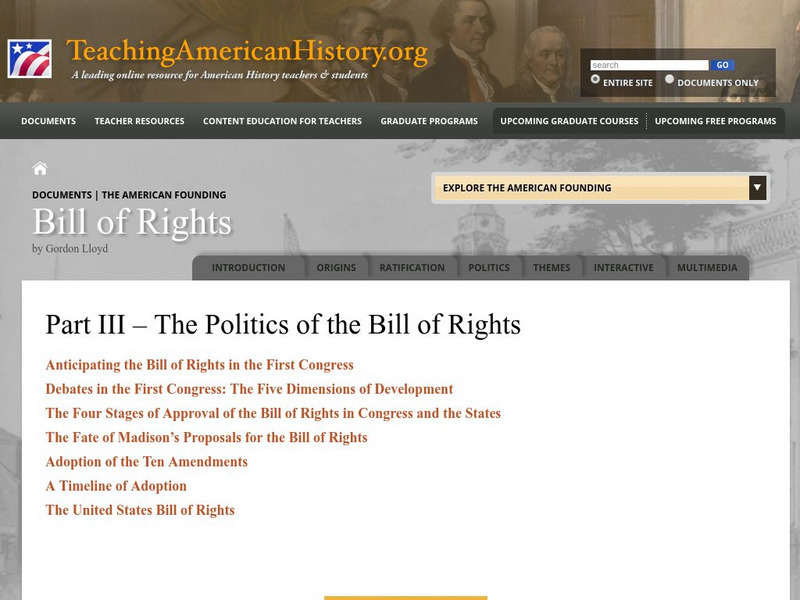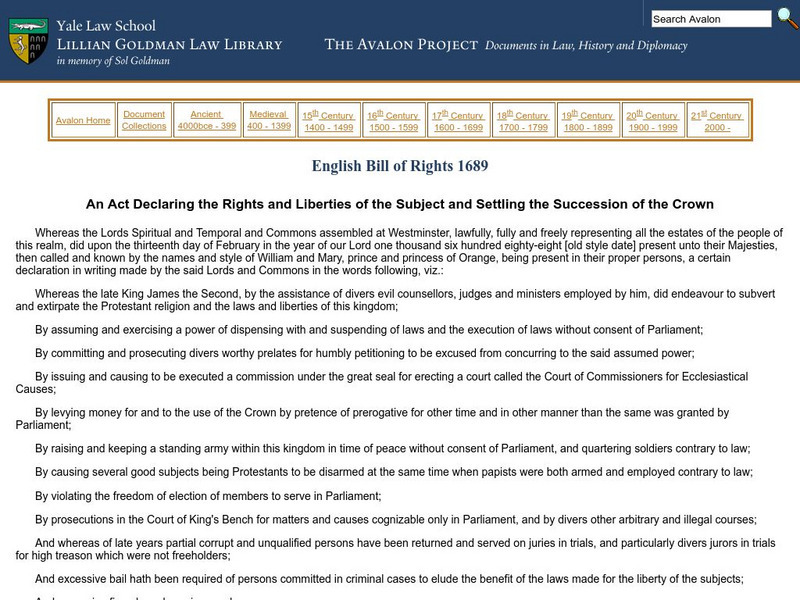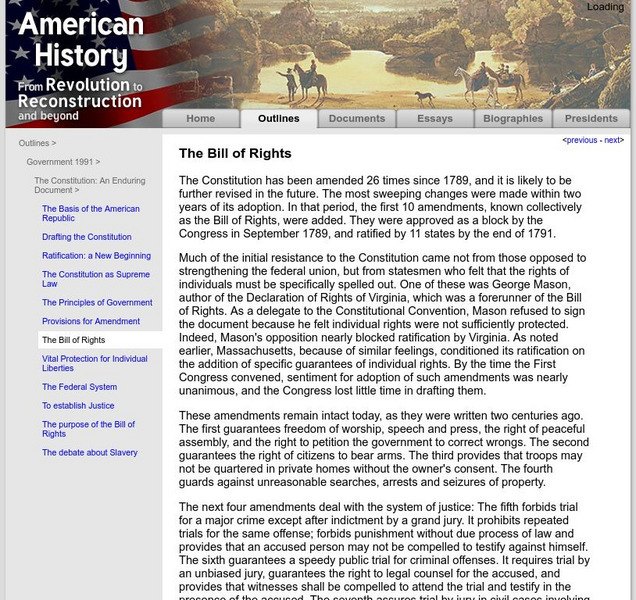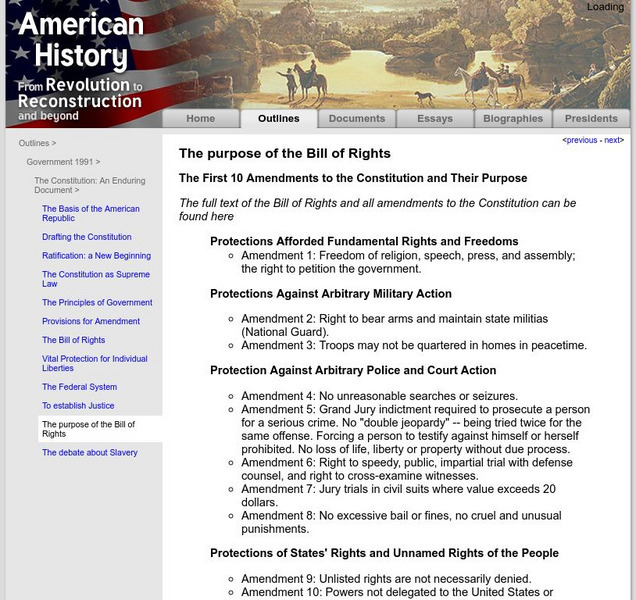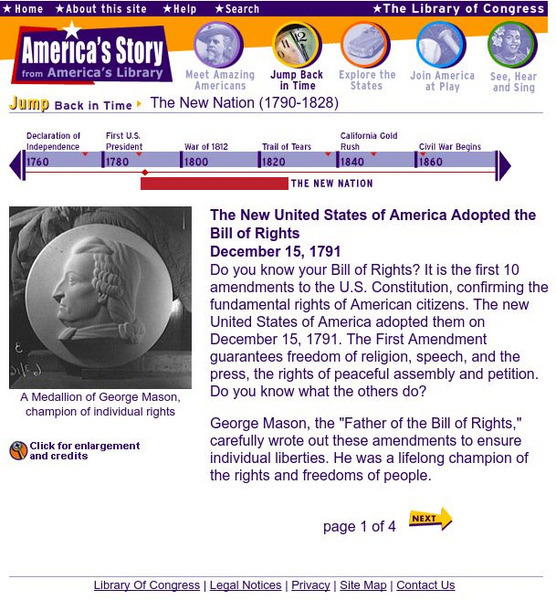Hi, what do you want to do?
Curated OER
Fact and Opinion Pre-Test
For this fact/opinion worksheet, students complete 10 multiple choice questions. Students may click on a link to view correct answers.
Curated OER
Various 11--Grammar and Spelling Quiz
In this interactive sentence completion learning exercise, students complete the ten given sentences by choosing the correct answer. The topics addressed include verb agreement and spelling.
Curated OER
Vietnam Trade Pact
Young scholars explore world trade issues. In this economics lesson, students read "Opening Doors to Vietnam," and discuss the trade negotiations between Vietnam and the Untied States. Young scholars conduct further research on the topic...
Colonial Williamsburg Foundation
The Colonial Williamsburg Foundation: The Bill of Rights
Take a close look at the United States Bill of Rights, the ten amendments to the U.S. Constitution. It was written a long time ago-1791. Move your cursor over the picture below to see if you can read the rights given to American citizens.
PBS
Pbs Learning Media: Writing in u.s. History: The Bill of Rights
Explore why the Bill of Rights was added to the Constitution and its enduring impact on defining our rights. In this interactive lesson from WGBH, students develop a written argument in response to the question "How does the Bill of...
Annenberg Foundation
Annenberg Classroom: The Bill of Rights Interactive Quiz
Many Americans take for granted the freedoms contained in the first 10 amendments to the Constitution. As students play this game, they will discover surprising facts about the story behind the Bill of Rights and gain a clearer...
Bill of Rights Institute
The Bill of Rights Institute: Free Lesson Plans
Free lesson plans concerning the Bill of Rights and the freedoms guaranteed by the Constitution. Included are lessons on important news stories occurring today, as well as lessons on famous Americans and how they executed their rights.
Teaching American History
Teaching American History: The Documentary Origins of the Bill of Rights I
Explore both the British and state influences on the U.S. Bill of Rights. Understand the origins of each amendment to the Constitution.
Teaching American History
Teaching American History: Origins and Politics of the Bill of Rights
Use an interactive spreadsheet to investigate both the origins and the politics of the Bill of Rights. Peruse the proposals made by James Madison and which ones were adopted. Click on the color-coded documents to view them.
PBS
Pbs Liberty!: Congress Adds a Bill of Rights
Informative site recounting the events of December 15, 1791, when the Bill of Rights was added to the Constitution. Learn about the Bill of Rights and the freedoms it was designed to protect!
Teaching American History
Teaching American History: The Politics of the Bill of Rights: Part Iii
Investigate what the politics were leading to the creation of the Bill of Rights. Identify how the debates in the first congress led to the stages of approval and ultimately the adoption of the ten amendments to the U.S. Constitution.
Teaching American History
Teaching American History: Bill of Rights Introduction
What is the Bill of Rights? Why were they created? Find out the purpose of these ten amendments to the U.S. Constitution and how they work to protect the citizens in the U.S.
Teaching American History
Teaching American History: Bill of Rights
Enrich learning about the U.S. Constitution's Bill of Rights with the help of this comprehensive resource. Find details about the amendments added to the new national document.
Huntington Library
Huntington Library: The Bill of Rights
In this lesson, 5th graders learn about the bill of Rights, why it was added to the Constitution, and its importance to the freedoms and liberties that Americans have today. Student resources are included.
Yale University
The Avalon Project: The English Bill of Rights 1689
An electronic version of the original English Bill of Rights, written in 1689, which influenced the writings of Thomas Jefferson, Benjamin Franklin, and John Adams, and laid the basis for American Democracy and common law.
Bill of Rights Institute
Bill of Rights Institute: Justice Thomas on National Identity
An examination of a speech Justice Clarence Thomas delivered in 2009 highlighting his thoughts on the Bill of Rights as well has his views on the importance of American civic responsibility.
Read Works
Read Works: American Government the Bill of Rights Part Ii
[Free Registration/Login Required] This informational text passage explains a few parts of the Bill of Rights. This passage is a stand-alone curricular piece that reinforces essential reading skills and strategies and establishes...
University of Groningen
American History: Biographies: George Mason the Virginia Bill of Rights
The Virginia Bill of Rights was the framework for the U.S. Constitution's Bill of Rights. Some of Mason's actual phrasing appear in the first ten amendments passed fifteen years later. He is credited for authoring the first American...
Read Works
Read Works: American Government the Bill of Rights Part I
[Free Registration/Login Required] This informational text piece shares a history to the Bill of Rights. This passage is a stand-alone curricular piece that reinforces essential reading skills and strategies and establishes scaffolding...
University of Groningen
American History: Outlines: The Bill of Rights
Article on the history and purpose of the Bill of Rights which spelled out specific protections in the first 10 amendments of the Constitution.
University of Groningen
American History: Outlines: The Purpose of the Bill of Rights
Text of the first ten amendments of the Constitution found in the Bill of Rights.
Library of Congress
Loc: America's Story: Bill of Rights
The Bill of Rights was adopted to protect each United States citizen's rights. Learn about how the Bill of Rights was formed and the protections it guarantees to Americans.
Ohio Test Prep
Ohio Test Prep: Bill of Rights
Ohio test preparation material on the Bill of Rights provides three video tutorials that hit specifically learning target 9 which is to cite evidence for historical precedents to the rights incorporated in the Bill of Rights.
National Endowment for the Humanities
Neh: Edsit Ement: The Creation of the Bill of Rights: "Retouching the Canvas"
In this lesson plan, students will consider "The Creation of the Bill of Rights: "Retouching the Canvas"." The plan includes worksheets and other student materials that can be found under the resource tab.








